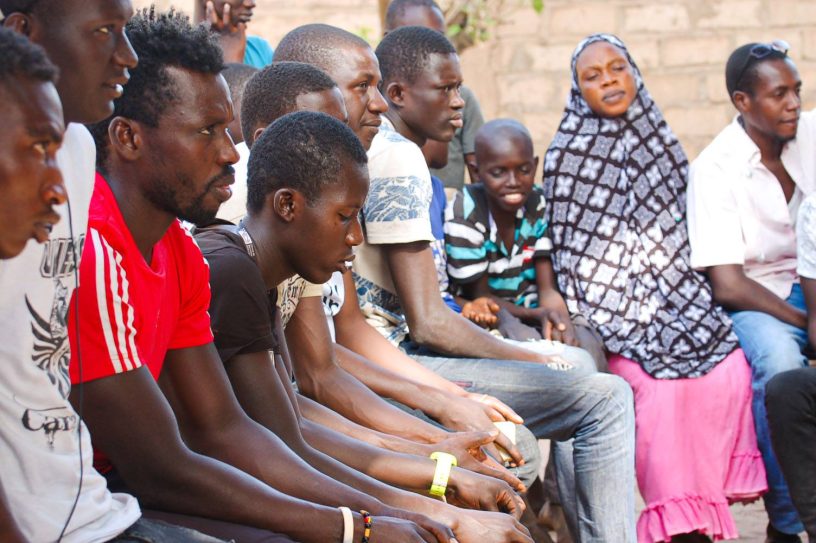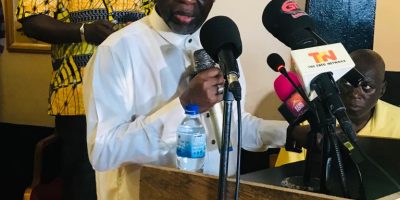 by Alagi Yorro Jallow.
by Alagi Yorro Jallow.
Part II
Fatoumatta: Ray Douglas Bradbury, an American author’s fictional “All Summer in a Day” book story of a class of children who migrated to Venus nearly approximates the situation of the Gambia’s generation of youths to whom existence is a daily struggle against the elements of a nation of hopelessness and jobless youths.
High profile national challenges, coupled with high-octane politics, have succeeded in effectively overshadowing what is perhaps the Gambia’s most enormous headache – the problem of youth unemployment. These domineering national problems include corruption, the threat of the coronavirus pandemic, tribalism, and fractious politics exacerbated by early political campaigning, leading one of the bitter, contentious, and fiercely partisan presidential elections in Gambia’s history in 2021 to mention but a few.
Fatoumatta: Bradbury’s schoolchildren on Venus were in a world of constant rainstorms. In their world, the sun came out only one hour every seven years. They never knew warmth. Only one of them had been old enough while on Earth to remember what the sun was and what alluring duvet it could be against the searing cold. This experienced girl, Margot, migrated from Earth to the new world five years earlier. So, to her mates, she describes the sun variously as “a penny” “like a fire on the stove.” She is so passionate about the subject that her friends, out of jealousy, even in their ignorance, refuse to accept her description of the sun. Her mates ostracise and even lock her up in a closet. They are to see the sun in its glory soon — “Its much better than sun lamps,” one of them says — then the rainstorm starts again and they rush back into the safety of their rooms only to remember that Margot has been forgotten in the closet while they savor the pleasing experience of the sun. Furthermore, are they sorry for robbing this girl of the once-in-seven-years experience of seeing the sun, which has come and gone? Although shame will not make them “meet each other’s glance,” the wicked have done their worst as the girl who longed for the sun has been robbed of it by the gross ignorance of her world of jealous humans.
Fatoumatta: The rainstorms of today’s Gambia have refused to abate for the youth. As a child, he never knew what childhood was. He was robbed of the joy of having playmates and of molding his future with the clay of the neighborhood. He was pushed into the world of schooling even during a suckling. Moreover, from thence, he was to know that the world is one of grit, sweat, and painful inconvenience. The youth moved from school to school, managed to escape the suffocation of the university, and landed on the laps of joblessness. If anyone ever told him that the sun had at a point shone on this land of rains, storms, and flood, he would sneer and spit on that untruth. He would not know that there had been days of food and jobs and hope.
Today, from Karthong town to the remote village of Koina, the lot of the young millennial generation born into the age of despotism Gambians is to struggle and journey to nowhere, a virtual interminable season of chillness without a day of sunshine. The joblessness youths of the Gambia do not have enough food, no cloth/drink “tapalapa bread” and water.” Today’s graduates and those coming behind them have had to be content with just not adequate” food/ clothing” tapalapa bread,” and water, for them, has become a luxury. That is the reward we got collectively for leaving the public space to strange men and women with the task of making a path for us for tomorrow’s journey. We abdicated the joint rescue effort forgetting that “if a nation surrenders its ancestral powers to its rulers,” it will “lose the essence of its nationhood.” We seem to have lost it.
Fatoumatta: Imagine a whole year without sunshine. Worse still, imagine a whole generation of humans to whom pelting stones of icy rain is a daily experience. There is a whole generation of Gambians who have never really enjoyed the warmth of the Earth and the cozy embrace of fortune. The World Bank, in a recent report, but the Gambia’s youth unemployment rate at 38 percent. Moreover, it defines youth unemployment as “the share of the labor force ages 15 to 24 without work but available for and seeking employment.” These are a critical part of our population who have never known what it means to enjoy life and do not know the right way to fight for that right. Various government policies, as well as section of the Constitution of the Gambia (1997), all define youth as those between 18 years and below 35 years and recognize that the youth are an essential component of our nation’s development.
According to official Statistical data, the youth constituted 32 percent of the population, 49 percent are male, and 51 percent female. There is an even more significant population of children below 18 years. This confirms that the Gambian population is strikingly youthful. The Gambia has what is often referred to as the “youth bulge.” This “bulge” is a double-edged sword. As numerous examples from history show, the youth can either be a blessing – known as the “youth dividend” – or a curse depending on how society handles them.
Fatoumatta: From an economic perspective, the youth is a national resource, representing 55 percent of the labor force – an excellent opportunity to accelerate economic growth when engaged productively, being, as they are, one vast reservoir of education, skills, energy, creativity, and innovation. In politics, the youth constituted 51 percent of registered voters in 2017, signaling rising interest and participation of the youth in national issues. However, the youth can be a source of debilitating civil strife, particularly if their collective frustrations meet with significant political mobilization. Recently, politically conscious but idle youth have been mobilized through social media to become the vanguard of ill-considered social revolutions, some of which have reduced formerly functional states to rubble.
Fatoumatta: The greatest challenge confronting the Gambia is, therefore, how to create meaningful economic opportunities in order to forestall unrest among the youth, about 10,000 of whom are entering the job market every year, according to official reports. As matters stand, the Gambian youth face not just a lack of jobs, but also underemployment, vulnerable employment, and inactivity. Some are compelled to migrate to risky foreign labor markets or lured into destructive behavior such as alcohol and drug abuse.
While a concerted effort by the government and its international development partners has put in place several resources to aid the youth in accessing gainful activities, access to these resources is hardly automatic. Most of them have to contend with a lack of collateral and rigid bureaucracies.
Additionally, the youth also find that the skills they acquired in school or college do not match the skills required in the marketplace. According to a 2018 report by UNICEF, “The documented consequences of high youth unemployment (and under-employment) include the costly high dependency ratio, the risk of civil disobedience, alcoholism and drug abuse, radicalization and the massive loss of productive energy.”
However, not every problem the youth face is externally driven. Some youths shun perfectly productive activities like agriculture. In 2017, the average age of farmers in the Gambia was over 60 years, testifying to the fact that local farming is highly deprived of the energy and innovativeness of the nation’s youth. Due to post-school inactivity and negative influence by wayward characters, the idle youth become susceptible to criminal activities, becoming radicalized and engaging in violent extremism.
There is evidence that the government is aware of the challenge before it and has been taking measures to ameliorate the situation. These include various legal, institutional, and policy frameworks have taken by successive governments to address issues affecting the youth.
Fatoumatta: The last three years or so, in particular, have witnessed spirited discussion and implementation of various education reforms, among them fee subsidies to enhance access, teacher training and technological upgrading to improve quality, and the transition to the competency-based curriculum in primary education and Technical, Vocational Education and Training to improve relevance.
Efforts by such institutions, while helpful, must acknowledge that in addition to general numeracy and literacy competencies, young people require specific skills and values that will help them cope and thrive in the knowledge economy.
Fatoumatta: These skills are known variously as 21st-century skills, social skills, character traits or attitudes, employability skills, soft skills, life skills, interpersonal people skills, transversal capabilities, socio-emotional competencies, or transferrable skills. Failure to impart these skills is the Achilles Heel of the Gambian education system. As reports notes in the report referred to earlier, “the education system in the Gambia lays heavy emphasis on academic and cognitive skills, with little focus on other competencies demanded by today’s living and working spaces such as communication, creativity, and critical thinking, grit or resilience and leadership skills.” the new curriculum, which has been met with much opposition, is aimed at correcting these anomalies in our education system. However, the curriculum, facing faces teacher capacity and resource inadequacies, needs to be augmented with other urgent interventions as it addresses school-going children while disregarding the “other half” that is out of school. To address the issue of job creation for its youth, the government is any time now set to re-launch a flagship initiative known as National Youth Service Scheme and the President’s Award Scheme that will address opportunities for youth participation in the economy more comprehensively. Developed in conjunction with a range of local and international partners, the National Youth Service Scheme can be closely aligned with the National Development Plan of President Adama Barrow.
A Country of Jobless Youths:




Ma sha Allah great and thanks for sharing